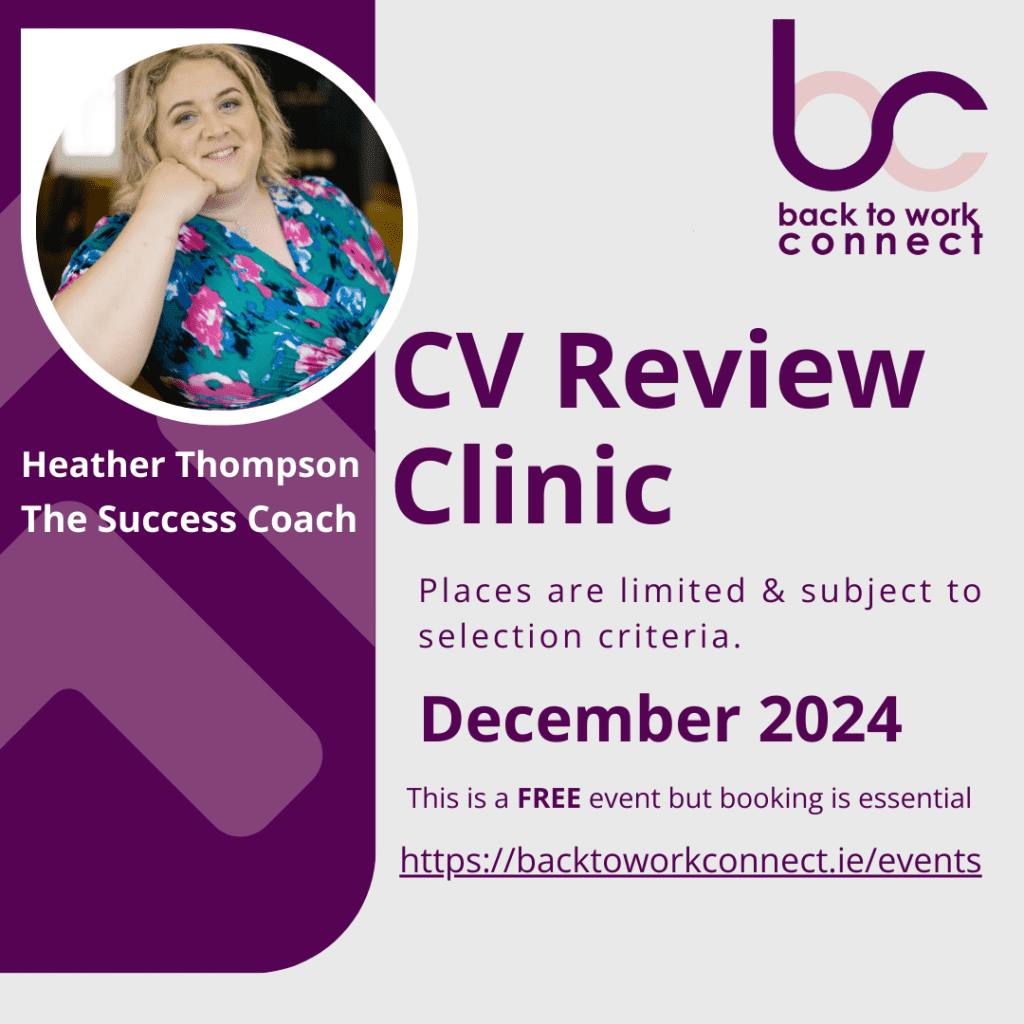Written by: Heather Thompson, The Success Coach
Does the thought of updating your CV after a career break feel overwhelming? You’re not alone.
After years away from the workforce, staring at a blank CV can feel daunting. Where do you even begin? Returners often feel this more acutely, as you’re concerned about how to position career gaps or periods of self-employment on your CV.
Good CVs are written from a place of self-assurance, requiring confidence in our skills, strengths and experience, alongside the self-belief to showcase our career stories in a positive light.
This blog by a certified career coach will provide you with some simple tips to write an effective, confident CV that reflects your skills and readiness to re-enter the workforce.
Six Tips for Writing a Compelling Return-to-Work CV.
- Don’t Ignore Career Gaps—Own Them. When you do, you give busy hiring managers an excuse to discard your CV. Own the gap. Be honest, but positive about it. You could choose to showcase what you used that time for, and any skills gained e.g., caring, travel, study, self-employment etc. At the very least, addressing it is better than ignoring it. When you ignore something, it doesn’t go away, you just leave the other person with no knowledge of what happened to fill in the gap.
- Master the CV Basics for a Polished, Professional Look. Having a well-formatted CV of an appropriate length helps you present your career story in an easy to digest manner. Using consistent font, sizing, date formats, and layout throughout, makes it easier on the person scanning it – human or non-human! Bullet points, rather than long paragraphs of text, improves readability for the person reviewing your CV, allowing them to quickly grasp your skills and achievements. A focus on formatting also makes sure that you have no wasted space on your CV, instead creating a professional-looking CV document you can share proudly.
- Focus on Action and Results to Impress. Don’t just list your past responsibilities, quantify results and outcomes, including figures, examples and achievements where possible. People want to know where you worked, what you did there, and most importantly, what was your impact? For example, instead of saying you dealt with a “high volume of client queries”, you could say “Dealt with 50+ customer queries daily via phone, email and live chat, consistently achieving a 95% customer satisfaction score”. Can you see how much more impactful that second, more explicit example is? It helps bridge the gap between your understanding of what you’ve done, the person reading your CV who has no idea.
- Use Recency Bias to Your Advantage. ‘Recency bias,’ occurs when hiring managers and recruiters tend to prioritise and give more weight to recent activities and achievements over older ones. You can take advantage of this by being proactive in taking action. Upskill to boost your own confidence, as well boosting the confidence of the person reading your CV that you are well positioned to acclimatise back into a work environment. There are many free and affordable training courses out there. You can also use this to your advantage by volunteering, or taking up part time/temporary work. Those reading your CV will see recent achievements as a reflection of current skills, active engagement, and professional relevance, which are key indicators of your readiness for a return to the paid workforce.
- Start Strong with a Standout Professional Summary. You have about six seconds to make an impression with the person reading your CV. This is why opening with a professional summary at the top of your CV is a powerful way to capture attention. It allows you to showcase succinctly your unique value, highlighting core skills and specifically what role you are seeking. Done well, it can captivate the reader and encourage them to explore the rest of your CV.
- Write your CV while Exploring Job Options. I often see clients trying to write their CVs before they have any idea of what type of work they want. If you are trying to write a CV without having any idea of your direction of travel, it’s going to make your job search longer and more difficult. Instead, be actively looking at the job market, at the same time as writing your CV. That way, you can start to understand how you can position your skills, strengths, and experience towards different opportunities, who you might talk to who could help you, and you’ll be clued in on any potential gaps, that you can then proactively start to close. Put as much effort into defining your career direction as you do into writing your CV.
Ready to get started? Try out these tips today and you will be well on your way to writing a confident return-to-work CV!

Heather Thompson Bio
Having written her first CV aged 14, Heather has a wealth of experience in CV writing. Early in her career, her CV got her chosen from 1000s of applicants onto a prestigious graduate programme, and later in her career, headhunted into leadership roles. Alongside her own dedication to fine tuning her CV writing skills, Heather has reviewed 100s of CVs globally in her time as a hiring manager for multiple companies, and now as a certified career coach.
Want personalised guidance on writing your return to work CV? Explore my CV support services at https://www.thesuccesscoach.ie/services/cvhelp and let’s make your career comeback a success!
If you have any questions, please don’t hesitate to contact The Success Coach, Heather Thompson, on successcoachheather@gmail.com





